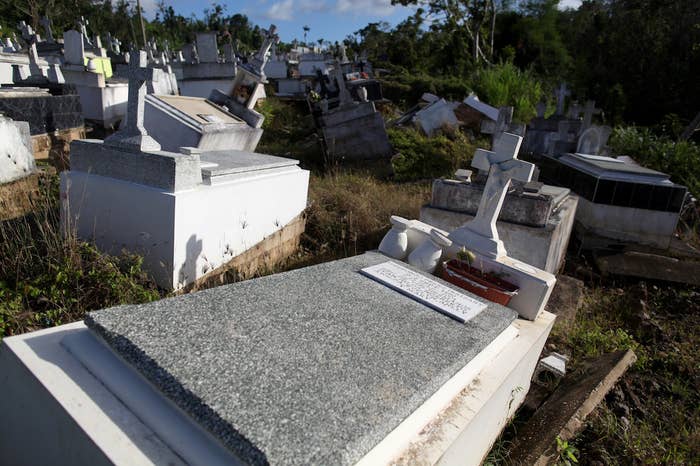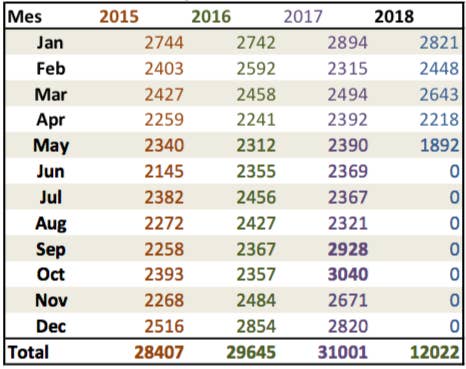
The Puerto Rican government on Friday released a new report showing a steep increase in the number of fatalities shortly after Hurricane Maria devastated the region.
The numbers were released one day after a lawsuit was filed seeking more information about the number of hurricane-related deaths and just days after a recent Harvard University study found that as many as 5,740 people might have died as a result of the hurricane — a number many times higher than the official death toll of 64 people.
Government officials had for months stopped providing public updates on the number of dead after the Category 5 hurricane.
"We congratulate the Department of Health for providing once more the tally of the number of registered deaths in Puerto Rico, which several investigators and journalists have demanded ever since this information ceased to be provided," Mario Marazzi-Santiago, executive director of the Institute of Statistics, said in a statement.
The Institute of Statistics filed the lawsuit against the health department for the death toll information Thursday.
Although the figures released Friday do not demonstrate an increase as high as what was estimated in the Harvard study, the numbers appear to suggest the real death toll from Hurricane Maria could be several times higher than original government estimates.
According to the new numbers, the government counted 2,928 deaths in September and 3,040 in October — nearly 700 deaths more each month when compared to 2016 and 2015.

Government officials are continuing to face questions regarding the local and federal response to help those on the island, and how many people died as a result of Hurricane Maria. Officials, including President Donald Trump, had previously touted the low number of deaths as a measure of a successful response.
But the lack of electricity on several parts of the island, which continues today, and questions about the real death toll, have raised questions about the response and the government's transparency.
In the first weeks after the hurricane, families and funeral directors in at least two towns told BuzzFeed News that dozens of deaths directly linked to the storm were not being counted in the government's death toll.
BuzzFeed News also found that 911 people, possibly hurricane victims, were cremated without the government's permission and without being examined to see if their death was caused by the storm.
In October, Puerto Rico's Department of Public Safety also told BuzzFeed News it had no specific guidelines to decide which was, and which wasn't, a death linked to the hurricane.
The Harvard Study also found that same lack of direction in its findings, saying indirect causes of death, such as from delayed medical attention for chronic conditions after the storm, may have been overlooked in death certificates.
Puerto Rican officials had stopped providing updates on the number of dead in December 2017, as questions were raised about the official tally on the number of people killed during the hurricane.
They have also faced criticism over not providing public data that would help answer questions over the true death toll after the hurricane.
Speaking with CNN's Anderson Cooper, Puerto Rico Gov. Ricardo Ricardo Rosselló said his government had "opened the books" to the data and that, if any agency was not cooperating, "there will be hell to pay."
Puerto Rico's governor says “there will be hell to pay” if government data on Hurricane Maria is not being made available by officials https://t.co/zCUjx84F4S https://t.co/tq3QvracZj
On Friday, Puerto Rico's director of Demographic Registry also pushed back against assertions that the government was withholding information from researchers or the public.
"The public information over the deaths was provided consistent with the policy of transparency," Wanda Llovet Díaz said in a statement. "We've made the information public, even when it has been under revision along with CDC [Centers of Disease Control and Prevention]. By law and to protect privacy, not all of the data is public."
Her agency, Llovet Díaz said, was also providing data to George Washington University, which was being contracted by Puerto Rico to conduct an investigation into the number of deaths on the island.
Marazzi-Santiago, of the Institute of Statistics, said his agency's lawsuit will continue to move forward since they were seeking data from each death.

